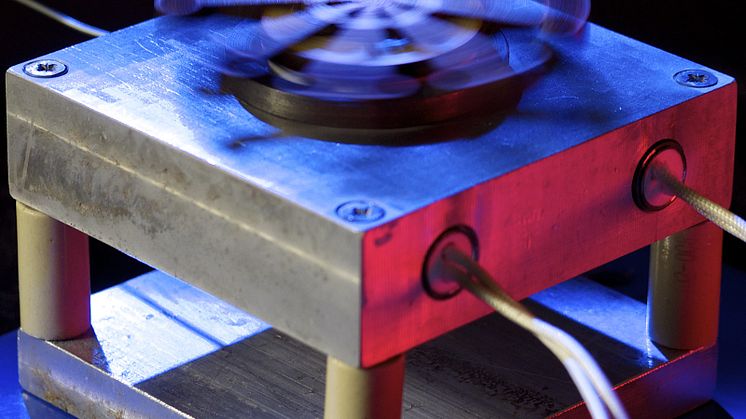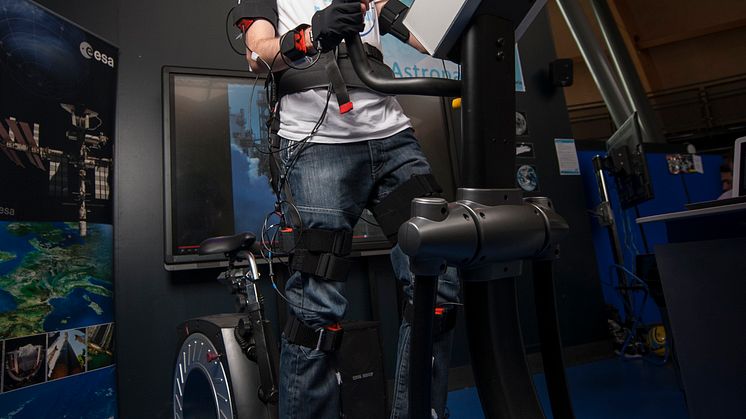
Press release -
Breakthrough in energy harvesting could power ‘life on Mars’
Martian colonists could use an innovative new technique to harvest energy from carbon dioxide thanks to research pioneered at Northumbria and Edinburgh Universities.
The technique, which has been proven for the first time by researchers at the two Universities, has been published in the prestigious journal Nature Communications.
The research proposes a new kind of engine for producing energy based on the Leidenfrost effect – a phenomenon which happens when a liquid comes into near contact with a surface much hotter than its boiling point. This effect is commonly seen in the way water appears to skitter across the surface of a hot pan, but it also applies to solid carbon dioxide, commonly known as dry ice. Blocks of dry ice are able to levitate above hot surfaces protected by a barrier of evaporated gas vapour. Northumbria’s research proposes using the vapour created by this effect to power an engine. This is the first time the Leidenfrost effect has been adapted as a way of harvesting energy.
The technique has exciting implications for working in extreme and alien environments, such as outer space, where it could be used to make long-term exploration and colonisation sustainable by using naturally occurring solid carbon dioxide as a resource rather than a waste product. If this could be realised, then future missions to Mars, such as those in the news recently, may not need to be ‘one-way’ after all.
Dry ice may not be abundant on Earth, but increasing evidence from NASA’s Mars Reconnaissance Orbiter (MRO) suggests it may be a naturally occurring resource on Mars as suggested by the seasonal appearance of gullies on the surface of the red planet. If utilised in a Leidenfrost-based engine dry-ice deposits could provide the means to create future power stations on the surface of Mars.
One of the co-authors of Northumbria’s research, Dr Rodrigo Ledesma-Aguilar, said: "Carbon dioxide plays a similar role on Mars as water does on Earth. It is a widely available resource which undergoes cyclic phase changes under the natural Martian temperature variations.
“Perhaps future power stations on Mars will exploit such a resource to harvest energy as dry-ice blocks evaporate, or to channel the chemical energy extracted from other carbon-based sources, such as methane gas.
“One thing is certain; our future on other planets depends on our ability to adapt our knowledge to the constraints imposed by strange worlds, and to devise creative ways to exploit natural resources that do not naturally occur here on Earth.”
The team at Northumbria believe one of humanity’s biggest challenges this century will be finding new ways to harvest energy, especially in extreme environments. It was this challenge which led them to develop their proposed Leidenfrost Engine.
Dr Gary Wells, co-author of the paper, explains the unique properties of an engine based on this phenomenon.
He said: “The working principle of a Leidenfrost-based engine is quite distinct from steam-based heat engines; the high-pressure vapour layer creates freely rotating rotors whose energy is converted into power without the need of a bearing, thus conferring the new engine with low-friction properties."
As well as potentially making long-term space exploration and colonisation more sustainable, the unique, low-friction nature of this engine could have other exciting applications, according to Executive Dean for Engineering and Environment, Professor Glen McHale.
Professor McHale, who also worked on the new research with Professor Khellil Sefiane, Dr Wells and Dr Ledesma-Aguilar, said: “This is the starting point of an exciting avenue of research in smart materials engineering. In the future, Leidenfrost-based devices could find applications in wide ranging fields, spanning from frictionless transport to outer space exploration.”
The research was a collaboration between academics in the Department of Physics and Electrical Engineering at Northumbria and Prof. Sefiane from the School of Engineering at the University of Edinburgh.
Dr Rodrigo Ledesma-Aguilar has also written a short article for The Conversation about his research and how it could be applied on Mars. His article is free to republish under creative commons license. Click here to read it.
Northumbria is committed to the creation of new knowledge and using research as a catalyst to drive excellence across its activities. The University offers courses in Physics and Physics with Astrophysics, as well as in a range of Science, Technology, Engineering and Mathematics (STEM) disciplines. For more information go to:www.northumbria.ac.uk/physics
Categories
Northumbria is a research-rich, business-focussed, professional university with a global reputation for academic excellence. To find out more about our courses go towww.northumbria.ac.uk
If you have a media enquiry please contact our Media and Communications team at media.communications@northumbria.ac.uk or call 0191 227 4571.















